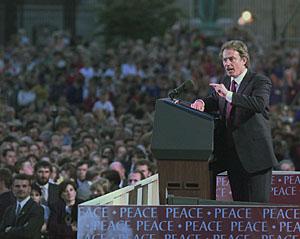|
Blair Ministry (other)
Blair ministry may refer to: * First Blair ministry, the British majority government led by Tony Blair from 1997 to 2001 * Second Blair ministry, the British majority government led by Tony Blair from 2001 to 2005 * Third Blair ministry, the British majority government led by Tony Blair from 2005 to 2007 See also * Premiership of Tony Blair * Shadow Cabinet of Tony Blair {{Disambig ... [...More Info...] [...Related Items...] OR: [Wikipedia] [Google] [Baidu] |
First Blair Ministry
The first Blair ministry lasted from May 1997 to June 2001. After eighteen years in opposition, Labour ousted the Conservatives at the May 1997 election with a 179-seat majority. The Prime Minister, Tony Blair, who turned 44 years old days after leading Labour to victory, was the youngest Prime Minister of the twentieth century. Blair quickly wiped away memories of the troubled Labour governments led by Harold Wilson and James Callaghan in the 1960s and 1970s as the economic recovery continued and unemployment continued to fall. While other developed countries, notably Japan, were hit by a financial crisis during Blair's first term in office, the British economy remained strong. In September 2000, however, protests against fuel prices intensified across the country and the Leader of the Conservative Party William Hague exploited the situation by pointing out to voters just how much fuel prices had risen under Labour. This sparked a brief Conservative lead in the opinion pol ... [...More Info...] [...Related Items...] OR: [Wikipedia] [Google] [Baidu] |
Second Blair Ministry
The second Blair ministry lasted from June 2001 to May 2005. Following the financial crisis in Japan at the end of the 1990s, there was a brief recession in other parts of the developed world including Germany, Italy and France in the early-2000s, but the UK avoided recession and continued to maintain a strong economy and low unemployment. By the time the next general election was on the horizon, Labour were looking well positioned for a record third successive term in government. Unemployment remained low and the economy remained strong with more than a decade of unbroken growth, and education and healthcare had changed for the better as a result of expenditure by Labour. However, the Labour government had attracted controversy by sending British troops to fight in Afghanistan in the aftermath of the 11 September terrorist attacks on the United States in 2001, and even more so when it joined the American-led invasion of Iraq eighteen months later – particularly when it emerge ... [...More Info...] [...Related Items...] OR: [Wikipedia] [Google] [Baidu] |
Third Blair Ministry
The third Blair ministry lasted from May 2005 to June 2007. The election on 5 May 2005 saw Labour win a historic third successive term in power, though their majority now stood at 66 seats – compared to 167 four years earlier – and they failed to gain any new seats. Blair had already declared that the new term in parliament would be his last. The Afghanistan and Iraq wars continued during his last ministry, and the 7/7 bombings also took place, Blair's government responded by introducing a range of anti-terror legislation. Blair announced in 2006 that he would resign as prime minister and Labour leader within a year. He resigned on 27 June 2007 and was succeeded by Gordon Brown, who had been his chancellor of the Exchequer since 1997. Cabinet Changes * November 2005 – David Blunkett resigns his post as Secretary of State for Work and Pensions. He is replaced by John Hutton, leaving the post of Chancellor of the Duchy of Lancaster vacant for six months. * May 2006 � ... [...More Info...] [...Related Items...] OR: [Wikipedia] [Google] [Baidu] |
Premiership Of Tony Blair
Tony Blair's term as the prime minister of the United Kingdom began on 2 May 1997 when he accepted an invitation of Queen Elizabeth II to form a government, succeeding John Major of the Conservative Party, and ended on 27 June 2007 upon his resignation. While serving as prime minister, Blair also served as the first lord of the treasury, minister for the civil service and leader of the Labour Party. As prime minister, Blair used the term "New Labour" to distinguish his pro- market policies from the more socialist policies which the party had espoused in the past. Many of his policies reflected a centrist "Third Way" political philosophy. In domestic government policy, Blair significantly increased public spending on healthcare and education while also introducing controversial market-based reforms in these areas. In addition, Blair's tenure saw the introduction of a minimum wage, tuition fees for higher education, constitutional reform such as devolution in Scotland and Wa ... [...More Info...] [...Related Items...] OR: [Wikipedia] [Google] [Baidu] |
